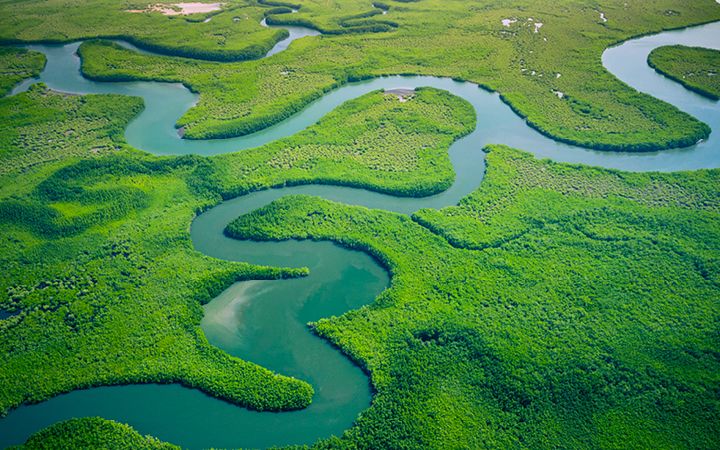
Driving climate change solutions: Key events in 2018
If 2017 was about new partnerships between states, cities, and companies, 2018 will be defined by solutions-oriented collaboration and technologies.
Last year, an historic slew of powerful natural disasters — from Hurricane Maria in Puerto Rico and other parts of the Caribbean to devastating wildfires throughout California — threatened communities around the world. And though many of these areas are on the road to recovery, we shouldn’t lose sight of the bigger picture: if climate change progresses unchecked, events like these will only become more frequent, severe, and difficult to anticipate.
In addition to the storms themselves, 2017 also saw several major shifts in U.S. climate and energy policy, most notably President Trump’s decision to withdraw the United States from the Paris Agreement. In response to this shift, we witnessed a new sense of urgency and unprecedented unity and collaboration across sectors and regions. A host of states, cities, businesses, NGOs, and universities across the United States announced their enduring commitment to hold global warming to two degrees Celsius. The “We Are Still In” declaration and the United States Climate Alliance demonstrated that a significant portion of the country remains determined to take action on climate.
If 2017 was about new partnerships between states, cities, and companies, 2018 will be defined by solutions-oriented collaboration and technologies. The most recent Intergovernmental Panel on Climate Change (IPCC) report indicates that global emissions must peak in the next two years and then rapidly decline if warming is to be kept below two degrees, a critical tipping point. To reach this goal we need to build on our momentum, tap into our wells of ingenuity and resourcefulness, and take action on climate — now.
How do we even begin? By coming together and learning from each other. A number of events have emerged as key platforms for energy, climate, and sustainability leaders to collaborate, share information and insights, and move the dial on climate.
The first is the 7th annual Climate Leadership Conference. The preeminent event for business and government to address climate change through policy, innovation, and business solutions, it will take place in Denver from February 28 - March 2. Bloomberg Philanthropies and the U.S. Climate Alliance have stepped up to support the event as the Headline Sponsor and Government Partner, respectively, following an announcement last summer that the U.S. Environmental Protection Agency would no longer sponsor the conference.
The conference brings together a global audience of hundreds of executives, practitioners, and organizations addressing climate change in their operations. Hosted by The Climate Registry and the Center for Climate and Energy Solutions, the Climate Leadership Conference will feature high profile climate leaders, including John Hickenlooper, Colorado Governor; Gina McCarthy, former U.S. EPA Administrator; Bill Ritter, founder and director of the Center for the New Energy Economy and former Colorado Governor; Dr. Katharine Hayhoe, leading climate scientist; and Kim Jordan, CEO of New Belgium Brewing. The event will set the solutions-focused tone for the rest of the year.
For the next two events we turn to California, arguably the bastion of U.S. climate policy. The North American Carbon World conference, hosted by the Climate Action Reserve, will take place in San Francisco from April 4 – 6. Now in its sixteenth consecutive year, NACW 2018 will explore the momentum and progress of subnational and international climate policy, carbon markets, and climate finance. By understanding emerging and dynamic trends in climate policy and markets, and building collaborative relationships with an expansive network of climate professionals, attendees will learn how to successfully meet the challenge of a carbon-constrained economy.
Next on the agenda for climate leaders is the Global Climate Action Summit 2018, which will be held in San Francisco next September. The summit will highlight the ongoing efforts to fulfill and quantify America’s Pledge. With Michael Bloomberg, Governor Jerry Brown, and Patricia Espinosa, Executive Secretary of the UNFCCC, as co-chairs, the summit is expected to accelerate action worldwide. Anyone who recognizes that climate change is an existential threat to humanity is encouraged to attend.
Last but not least is COP24 in Katowice, Poland in December 2018. The annual meeting of the United Nations Climate Change Conference will continue to build on the work done at the Climate Leadership Conference and Global Climate Action Summit, implementing projects internationally to reach the goals of the Paris Agreement. If the unprecedented participation of U.S. subnational actors including governors, mayors, legislators, and policy experts at COP23 was any indication, we can expect to see even deeper commitments emerge in Katowice.
Each event builds on the last, advancing solutions and expanding cooperative frameworks. 2018 will be a decisive year in the global effort to reduce emissions and adapt to a changing world. Alongside an ever expanding group of governments, scientists, universities, businesses, and individuals we are confident that together, we can make global warming history.
Dana Coffman is a Development Associate with the Climate Registry.
